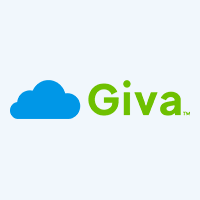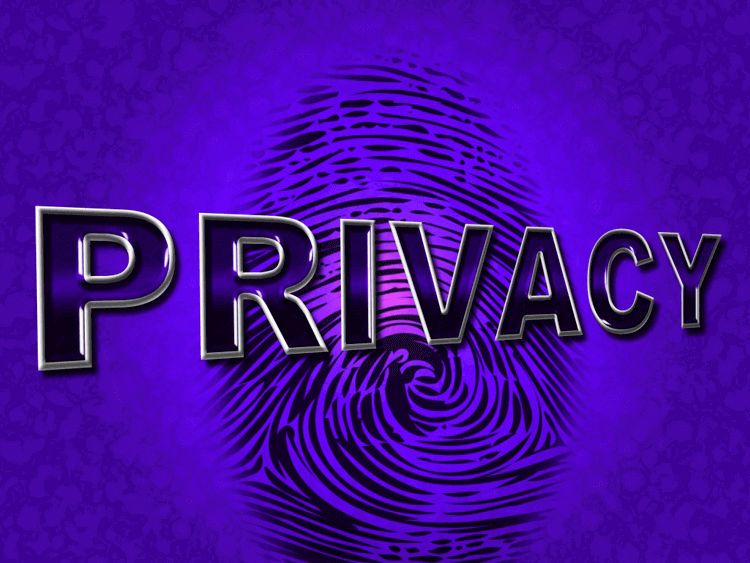Top 8 HIPAA-Compliant Text Messaging Apps
We have compiled a list of the top HIPAA-compliant messaging apps which provide concise descriptions and key features, assisting healthcare practices and systems in maintaining patient data securely and providing a better patient experience in the ever changing nature of healthcare technology.
For years, the pager was the device of choice used by healthcare organizations and professionals. However, pagers have not necessarily adapted with the times and have very few features relative to today's technology; and so, smartphones have become a better and more effective method of messaging. Yet, security and data protection are issues, as text messages are stored by providers and on the applications over which they are sent. These systems are not always HIPAA compliant, and if you plan on using them to transmit Personal Health Information (PHI), then they must be.
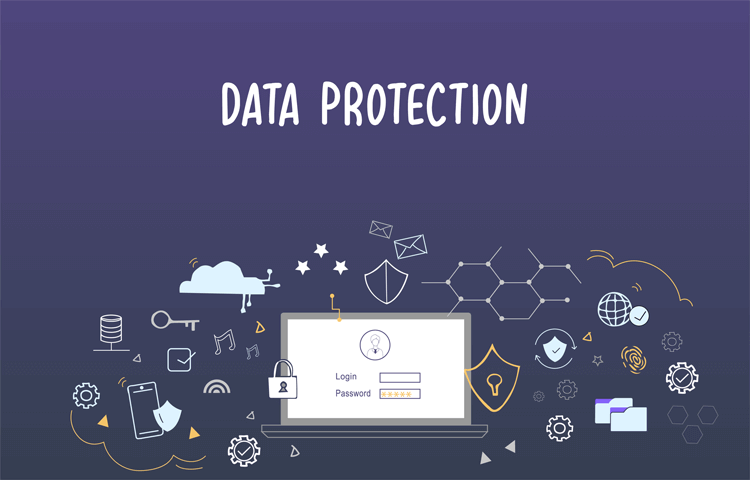
8 Best HIPAA-Compliant Messaging Apps
-
OhMD
OhMD is trusted by over 300,000 healthcare providers. This HIPAA-compliant text-messaging platform works well for provider-patient communications and general practice communication amongst healthcare teams. Users can send and receive intake forms, surveys, and files like images, and the program can also send appointment reminders.
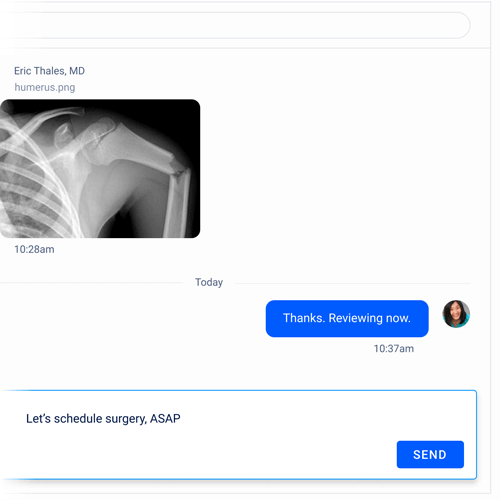 Image courtesy of OhMD
Image courtesy of OhMD -
TigerConnect
TigerConnect allows providers to work out of an organized inbox of messages. It can sync messages across devices, including tablets and smartphones, and the ability to recall a message sent to the wrong person. To securely send messages, TigerConnect utilizes 256-bit AES encryption. Also, for peace of mind, messages can't be copied, pasted, or forwarded. Whether you are a patient or provider, you will have to verify your identity via user name and password for authentication before entering the secure messaging platform.
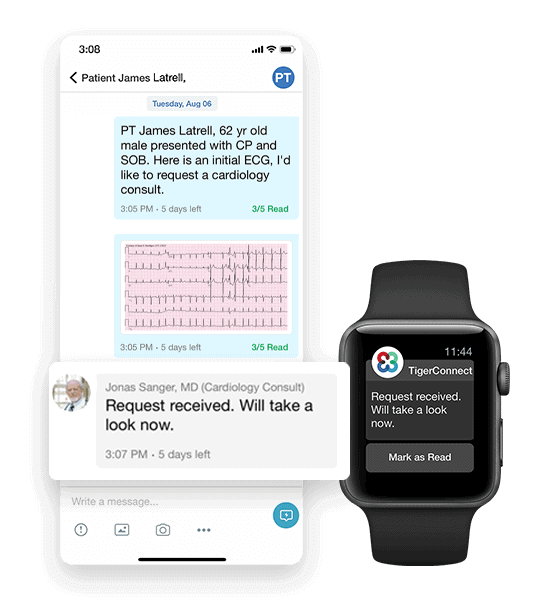 Image courtesy of TigerConnect
Image courtesy of TigerConnect -
Spok
Spok helps providers streamline workflows while keeping sensitive PHI safe. Some of its most notable features include encryption and the ability to lock the application or remotely wipe data from a device when a cyber threat occurs. Another nice feature is known as the Spok Device Preference Engine. This ensures that patients and providers receive information on the device of their choosing, depending on the message urgency. For example, providers may choose to receive urgent messages on their smartphones, while less urgent ones go to an email address.
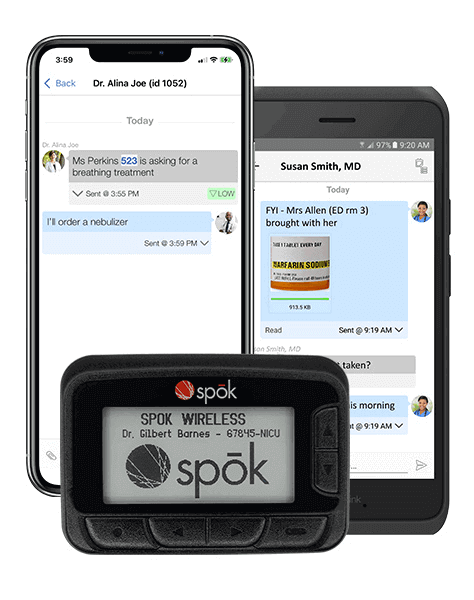 Image courtesy of Spok
Image courtesy of Spok -
Notifyd
Notifyd is a scheduling and notification system designed for home healthcare. Their encrypted messaging app makes it easy, quick, and efficient to schedule appointments, coordinate treatment, and perform other job-related tasks. Employees can communicate, share documents, and take images and videos right from their phones and desktop. What was once a coordinated effort across office personnel can be accomplished by one person now.
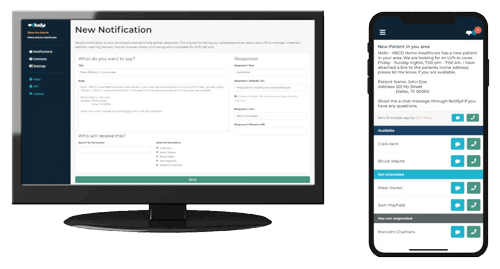 Image courtesy of Notifyd
Image courtesy of Notifyd -
Klara
Klara streamlines healthcare communication through automated text messaging, optimizing patient engagement. It helps reduce no-shows with appointment reminders and offers flexible scheduling options. Klara promotes two-way communication, which provides quick, interactive responses. Additionally, it facilitates broadcast messaging for critical updates and information dissemination.
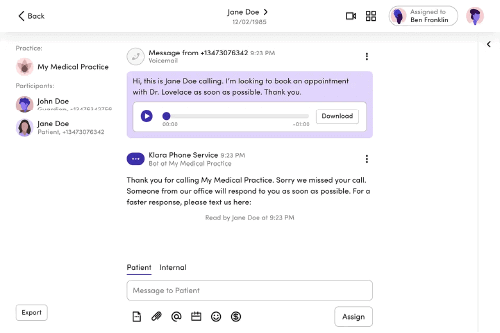 Image courtesy of Klara
Image courtesy of Klara -
QliqCHAT
QliqCHAT is a versatile secure texting application trusted by over 1000 customers. It allows users to switch seamlessly between secure texting, voice, and video calls. Additionally, QliqCHAT enables the capture and sharing of various types of media such as images, video clips, and audio recordings. Further, the app also enables the capture of electronic consent signatures, streamlining administrative workflows.
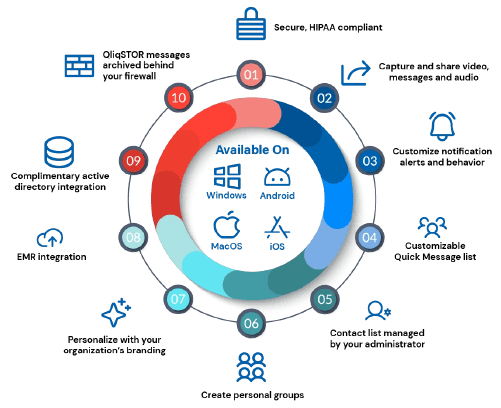 Image courtesy of QliqCHAT
Image courtesy of QliqCHAT -
Providertech
Providertech is a 2-way text messaging solution that requires no app for the patient — all is done via texting. Providers and health centers and easily send documents and images, securely, including photos, videos, and files. Moreover, it is built on Azure's HITRUST Certified Cloud.
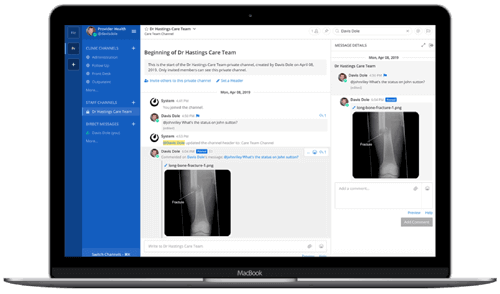 Image courtesy of Providertech
Image courtesy of Providertech -
Luma
Luma allows medical professionals to securely communicate with patients via text or real-time chat. There are no patient portals or apps for them to download. Patients can upload documents as well, such as those for insurance.
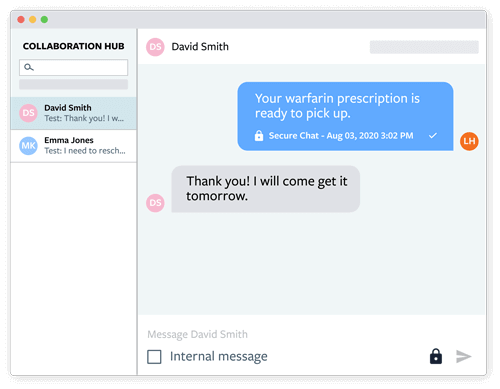 Image courtesy of Luma
Image courtesy of Luma
The Benefits of HIPAA-Compliant Texting
Text messaging is an everyday part of people's lives now, and consumers of all ages have learned to adapt to new texting technologies. Allowing employees to use devices they are familiar with outside of the workplace is a way to implement new technologies without transition problems. By giving doctors, patients, and health practitioners the ability to respond to a problem as soon as they see the message, they can work much more efficiently and maintain patience privacy while still transmitting Personal Health Information (PHI).
What are the HIPAA-Compliant Text Messaging Requirements?
Generally speaking, HIPAA does not permit sharing PHI via text message. There are however a few notable exceptions according to HIPAA Journal:
- The Covered Entity has informed the patient that the risk of unauthorized disclosure exists and has obtained the patient's consent to communicate by text. Both the warning and the consent must be documented.
- When the U.S. Department of Health and Human Services waives rules for text messaging after a natural disaster such as a hurricane.
- When the Covered Entity has implemented a solution such as a HIPAA-compliant messaging app that has the necessary controls and encryption to support HIPAA-compliant texting.
HIPAA-Compliant Messaging: A Case Study
Empirical evidence shows just how effective a secure messaging platform can be. Imprivata, a provider of secure text messaging, conducted several studies on their own program, Imprivata Cortext. Community Healthcare and Wellness Centers in Ohio implemented Imprivata Cortext in their own centers. As a result, their Hospital Consumer Assessment of Healthcare Providers and Systems (HCAHPS) score increased by 30%. They experienced a 10% return on investment as well as a 15 minute reduction in admission time. Imprivata Cortext's research alone shows how transitioning to a secure text messaging system can be a wise economic decision.
Further, Patrick Streck, Director of IT Services at Baystate Health, stressed the importance of secure communication in a healthcare setting when he said, "There's more than just the communication between the physicians: there's logistical communication between teams that are servicing the rooms, servicing the beds, moving patients, and transport, all of these things have to be considered when coming up with a unified communications system and one of those key components is that secure messaging platform that allows us to confidently pass along patient data without jeopardizing their information or PHI."
The Bottom Line for HIPAA-Compliant Messaging Apps
Even if you are not a healthcare provider or only provide services to a healthcare provider, you can benefit from having secure text messaging. It allows employees at any company to communicate sensitive information promptly. The benefits reaped by the healthcare industry may be applied to many other industries in light of the emphasis on efficient communication and coordination. Additional benefits such as higher return on investment and increased productivity are important to companies as well. Whether or not you are in the healthcare industry, your business will benefit from the ability to quickly and securely send messages containing confidential and private information.
Giva's easy-to-use and set up help desk and customer support applications are HIPAA compliant. Learn more at our HIPAA compliance section.
